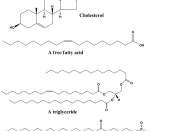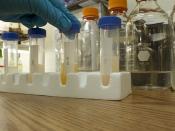The title of this experiment is Probiotic capsules do not lower plasma lipids in young women and men. The objective of this investigation was to clarify the effect of probiotic bacteria administered in capsule form on plasma lipid concentrations.
Independent variableThe independent variable is the probiotic capsules. Probiotic bacteria have been defined as live microorganisms, which when consumed in adequate amounts, confer a health effect on the host. These bacteria have been hypothesized to enhance the immune response, treat antibiotic or travelers diarrhea, improve gastrointestinal health and reduce fecal enzymes implicated in cancer initiation. Probiotic bacteria are incorporated into dairy foods such as milk and yogurt or packaged as capsules for human consumption.
In vitro experiments have suggested several mechanisms for the cholesterol-lowering effect of probiotic bacteria such as L. acidophilus and Bifidobacterium Bacteria may directly remove cholesterol by incorporating it into the bacterial cell membrane, binding cholesterol to the cell surface or assimilating cholesterol during growth.
In addition, bacteria may produce bile salt hydrolase and deconjugate bile acids. The resulting bile acids co-precipitate with cholesterol and are excreted in the feces, thereby reducing cholesterol through fecal excretion and through the synthesis of additional bile acids from cholesterol.
The majority of studies examining the effect of probiotic bacteria on plasma lipids have employed fermented milk products as the vehicle of administration. Although most studies have reported a hypocholesterolemic effect , not all investigations support this result. The logistics of procuring and storing a fermented milk product for daily consumption and the dietary modification required to accommodate the additional calories contained in fermented milk products have prompted an exploration of alternative methods for ingesting probiotic bacteria.
Capsules containing freeze-dried probiotic bacteria are a more convenient and calorie-free medium with a refrigerated shelf life of up to 12 months. Probiotic capsules and lipids have been examined in several human studies, but with conflicting results. An initial pilot trial produced promising decreases in plasma TC and low-density lipoprotein cholesterol. However, with the exception of one recent investigation, blinded- and placebo-controlled investigations have not demonstrated a hypocholesterolemic effect of probiotic bacteria in capsule form. Therefore, the objective of this investigation was to clarify the effect of probiotic bacteria administered in capsule form on plasma lipid concentrations.
Dependant variableThe dependant variable is plasma lipid. Coronary heart disease (CHD) is a leading cause of disability and death in industrialized countries. Epidemiological and clinical investigations have demonstrated a positive association between plasma total cholesterol (TC) concentration and CHD risk; in addition, a decrease in plasma cholesterol has been shown to result in reduction of risk. Numerous pharmacological and dietary approaches have been proposed to achieve this cholesterol reduction, including the administration of probiotic bacteria.
Sampling Method to Gather SubjectsThis study was part of a larger investigation examining the effects of probiotic consumption on equal excretion and plasma hormone concentrations. Healthy men and premenopausal women age 18-36 years were recruited from the Minneapolis/St Paul metropolitan area and enrolled in the study after a telephone screening and review of a detailed self-administered questionnaire. Exclusionary criteria included BMI 30 kg/m2, weight change of more than 4.5 kg within the previous year or more than 2.3 kg within the previous 2 months, antibiotic or exogenous hormone use within the last 3 months, probiotic supplement use within the last 30 days, alcohol consumption greater than seven drinks/week, chronic health problems, regular medication use and for the women menstrual cycles 32 days and current pregnancy or lactation. Minimum or maximum lipid concentrations were not part of the exclusion criteria; however, all subjects completing the study were normocholesterolemic. The Institutional Review Board: Human Subjects Committee of the University of Minnesota approved the study protocol. All subjects provided written, informed consent before participation in the study.
ReliabilityThe idea behind reliability is that any significant results must be more than a one-off finding and be inherently repeatable. Other researchers must be able to perform exactly the same experiment, under the same conditions and generate the same results. This will reinforce the findings and ensure that the wider scientific community will accept the hypothesis.
ReferencesExperiment-Resources.com. (2009). Reliability and Validity. Retrieved June 13, 2009 from:http://www.experiment-resources.com/validity-and-reliability.html#ixzz0ILReQNS5&D


